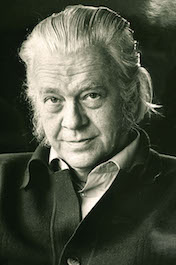E.F. Schumacher
- JOHN JANARO
The phrase "small is beautiful" has become proverbial in recent decades.
 E.F. Schumacher
E.F. Schumacher1911-1977
It evokes a sense of life "on a human scale" rather than as an endless race to acquire material possessions, and of human persons acting as responsible stewards of creation rather than destroyers of the earth. For the German-born British economist Ernst Friedrich ("Fritz") Schumacher, the phrase encapsulated a lifetime of thought and activity, and became the title of his famous 1973 book Small is Beautiful: Economics as if People Mattered. This book corresponded to a nearly sixty-year intellectual and spiritual search for truth, not only about economics but also about the purpose and value of human life, which led him to enter the Catholic Church shortly before the book's publication, and only six years before his death.
Fritz Schumacher was born in 1911, and raised in a nominally Lutheran but generally secular home. With his keen, ambitious mind, he studied economics at Oxford University in England in the early 1930s. By the time he returned to Germany in 1934, Fritz was a committed atheist. Nevertheless there was something deeper already at work in him — a desire for truth, moral responsibility, and human dignity — that made him revolt against the Nazi ideology of the "New Germany." He loved his country, but he preferred exile to compromise with Hitlerism, and left Germany permanently for England early in 1937.
Though marginalized as an "enemy alien" during the war, Fritz became a naturalized English citizen in 1947, and served for twenty years as the economist for Britain's National Coal Board. Meanwhile, he continued his intellectual search. Marx fascinated him at first, but he was ultimately struck by the insufficiency of scientific materialism. He sought a meaningful, "inner life" — a spiritual path. His rediscovery of Christianity, however, was inspired by his time spent in Burma as economic consultant in 1955. He realized there that the Buddhist religiosity of the Burmese people shaped their way of valuing work, community, and material possessions. This convinced him that economics could not function without a deeper understanding of what gives value to human life as a whole. Economics must serve people. And people are made for something greater than this world. The vital religious sense of Burmese Buddhists led Fritz to reconsider the religious dimension that had once been so central to Europe's own culture.
At this point, Fritz himself might have been content with studying Christianity as a "higher religious wisdom" that helped shape his economic theories and give broad religious direction to his own life. Yet his life itself led him to a more concrete commitment. His wife and his oldest daughter both were drawn to the Catholic Church in the 1960s, and his own admiration for the courage and intelligence of Catholic social teaching was enhanced dramatically by Pope Paul VI's encyclical Humanae Vitae (even while so many Catholics rejected it). Here it was clear to Fritz that Catholic teaching witnessed to the value of human persons beyond all calculations of merely material prosperity. He quietly decided to join his wife and daughter and became a Catholic at the age of sixty. After a life of searching for truth and discovering the need for wisdom, Fritz Schumacher finally allowed himself to be embraced by Christ, Wisdom Incarnate, in the living fullness of his Catholic Church.
 This is Meaghen Gonzalez, Editor of CERC. I hope you appreciated this piece. We curate these articles especially for believers like you.
This is Meaghen Gonzalez, Editor of CERC. I hope you appreciated this piece. We curate these articles especially for believers like you.
Please show your appreciation by making a $3 donation. CERC is entirely reader supported.

Acknowledgement
 John Janaro "E.F. Schumacher." Magnificat (July, 2019).
John Janaro "E.F. Schumacher." Magnificat (July, 2019).
Reprinted with permission of Magnificat.
The Author

 John Janaro is Associate Professor Emeritus of Theology at Christendom College. He is a Catholic theologian, and a writer, researcher, and lecturer on issues in religion and culture. He is the author of Never Give Up: My Life and God's Mercy and The Created Person and the Mystery of God: The Significance of Religion in Human Life. He is married to Eileen Janaro and has five children.
John Janaro is Associate Professor Emeritus of Theology at Christendom College. He is a Catholic theologian, and a writer, researcher, and lecturer on issues in religion and culture. He is the author of Never Give Up: My Life and God's Mercy and The Created Person and the Mystery of God: The Significance of Religion in Human Life. He is married to Eileen Janaro and has five children.




